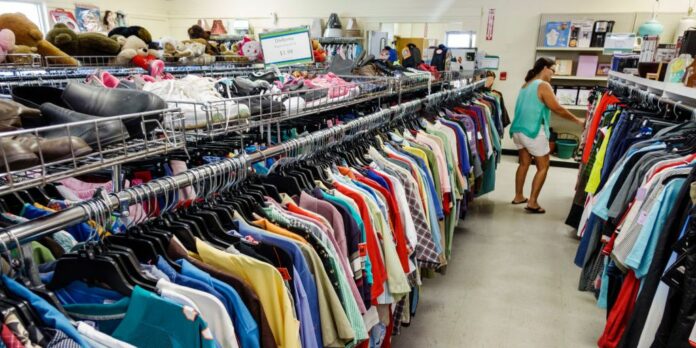Is goodwill for profit – Goodwill Industries, a global non-profit, aims to help individuals with trouble finding gainful work by providing them with job training, placement assistance, and community-based initiatives. Around 3200 thrift shops throughout the globe provide the majority of the organization’s operating funds. Many people are curious to get an answer to the question is goodwill for profit.
According to Forbes’ 2020 article, “The 100 Biggest U.S. Charities 2020,” Goodwill ranked 50 due to its $5.8 billion earnings that year. The overall income dropped by 11% because of the closures caused by the epidemic, but $5.8 billion is still a lot of money. Despite all the good that Goodwill has done for communities throughout the globe, it is still viewed with suspicion. In detail, let’s discuss the answer to goodwill for profit.
All of Goodwill’s proceeds go towards localized charity.
People ask if is goodwill for profit; let’s have clarity about it. After covering overhead, most of Goodwill’s revenue supports its charitable missions. Goodwill was established in Boston in 1902 by Reverend Edgar J. Helms. Reverend Edgar’s mission was to help the jobless by collecting the wealthy’s unwanted clothing and having his congregation mend it. These were subsequently given to others in need in the neighborhood, including those hired to repair the garments.
Reverend Edgar’s charity, then known as Morgan Memorial Cooperative Industries and Shops, Inc., hosted visitors from a workshop mission in Brooklyn, New York, in 1915. To get the Brooklyn mission to imitate his strategy, Reverend Edgar changed the name of his workshop to “Goodwill Industries.”
Goodwill’s business strategy is similar, except that it relies on the monetary value of donated goods. The group then encourages locals to buy at its sale store. Stores like this are great because they boost the economy and donate some of their profits to job initiatives.
The fact that Goodwill shops are autonomous means that each one may create a set of solutions tailored specifically to the needs of its neighborhood. For instance, Goodwill in southern Arizona provides local youngsters funding to study for and pass the GED or high school graduation exam.
Goodwill in Southern Arizona knows that many local youngsters still need to finish high school. Hence it provides money for initiatives that address the problem. Here is what you’ll find on the website for Goodwill Southern Arizona:
“Fundraising is a significant expense for many non-profits. In contrast, Goodwill doesn’t. Goodwill is primarily a community-supported business since most of our income comes from selling donated products at thrift shops.
False claims of money missing from Goodwill have been made.
Goodwill’s positive impact as a charity has been widely acknowledged. Goodwill is supposedly a non-profit organization. However, various news outlets have reported that its senior executives are paid lavish salaries. Looking at the websites of Goodwill shops, one can see that the company is committed to donating a significant portion of its income to good causes. Several businesses boast that 80% or more of their profits are donated to charitable causes.
However, research suggests that some bosses steal from the poor to line their pockets. According to World-Herald writer Henry Cords, most of Goodwill Omaha’s funding comes from government subsidies to provide services to the community.
Cords reported that just $557,000 of Goodwill Omaha’s yearly $4 million revenues went towards actual programmer expenses. Were almost seventy-five percent of annual revenues wasted? Naturally, it goes straight into the wallets of the ruling elite.
Disgraced Frank McGee, the former CEO of Omaha, received a six-figure salary, a country club membership, a $100,000 yearly performance bonus, and a $519,000 lump payment upon his retirement. Moreover, 13 Goodwill executives made over $100,000, and it got worse.
Frank was fired, and when the board refused to give him the severance he had negotiated, he took legal action. Finally, in 2018, the board paid Frank $610,000 to end the litigation. However, the drama damaged goodwill’s image as a charity. As a result of Goodwill’s refusal to disclose, rumors have spread concerning possibly shady business practices.
Goodwill’s finances are relatively easy to get into. Due to a confidentiality agreement, the board members could discuss the settlement amount made to Frank two years after it had occurred.
In 2020, when the organization filed its tax return, the settlement terms became public knowledge. As Goodwill shops seldom provide their financial data publicly, we must depend on tax returns to learn about their operations and the allocation of funds.
Goodwill’s supposed non-profit status has been questioned in light of this omission. ABC 13 News discovered that Goodwill Industries in northwest North Carolina rewarded its CEO, top four vice presidents, and tens of thousands of dollars in bonuses.
Furthermore, the charity promised the former CEO $74,000 yearly until his death. “It’s surprising what you find out by looking at a charity’s audited financial report,” said Norma Messer, president of the Better Business Bureau serving Asheville and Western North Carolina. “It’s something everyone should know, and that’s how they can find it out: by looking at the report, where those details are required to be included along with the income.”
Goodwill has been accused of using a loophole in federal law to pay its disabled employees less than the minimum wage.
Surprisingly, Goodwill uses a legal loophole to pay its disabled employees less than the minimum wage. Some Goodwill employees in Pennsylvania earned “wages as low as 22, to 38, and 41 every hour,” as NBC News’ Anna Schechter reported. Section 14 (c) of the Fair Labor Standards Act allows companies to pay disabled employees much less than the federal minimum wage in exchange for a “special minimum wage certificate.”
Sheila Leigland, Harold’s wife, left her job at Goodwill because of compensation reductions. The charity instituted pay reductions for low-performing workers.
It was a challenging challenge for Lei gland, who is blind since he had to correctly hang 100 items of clothing in a little over half an hour. Because “we can’t glance at a garment and see the size,” she said that the process could not be completed quickly.
A failure was nearly inevitable for Sheila, as was a further decrease in her already meager salary. But, as Sheila put it, “it’s not just me; all Goodwill workers deserve the same.” They brag that they’re the pioneers in making the world accessible to people with disabilities, but when does “accessibility” mean “a quarter of an hour”?
According to Country Living, National Federation of the Blind head Chris Danielson says that organizations that pay impaired people below minimum wage claim they cannot afford to do so. On the other hand, Goodwill makes billions of dollars annually, so it can easily afford to pay its workers at least the federal minimum wage.
Danielson revealed that Goodwill Industries’ CEO, James Gibbons is blind. Although other blind workers are paid less than minimum wage, he makes half a million dollars or more. There are a lot of ironies there. Corporate leaders from Goodwill have been advocating for communities to take the reins in making the changes they want to see in their neighborhood thrift shops. Goodwill claimed that the company should be commended for hiring people with disabilities and paying them a salary, even though some of its outlets offered subminimum wages.
Many people ask the question, is goodwill for profit? According to Country Living, Goodwill Industries’ Brad Turner-Little said that local businesses and neighborhoods are responsible for raising disabled workers’ pay and working conditions. Some Goodwill businesses pay their employees less than the federal minimum wage, but Brad said that such choices are made locally and are subject to the regulation of Goodwill groups in their areas.
To help disabled persons find jobs, he recommended that towns work with other groups to provide the necessary infrastructure. Here is what Turner-Little had to say: It can include ensuring sure companies have the resources they need to properly integrate people who have disabilities, some of whom have specific requirements on the workplace, or bolstering current public transportation, particularly in rural places.
In a surprising decision for a charity aiming to “remove obstacles to opportunity and assist individuals in need to realize their full potential,” Brad exonerated Goodwill of duty and put the burden of paying disabled employees fair wages rather than on Goodwill.
In response to the harsh requirements of Section 14 (c), several states have passed laws that guarantee disabled workers no less than the federal minimum wage. On the other hand, the minimum wage has been banned in the states of Delaware, Colorado, and many more.
The above-listed portion explains the answer to is goodwill for profit in detail.
FAQs:
Is goodwill a non-profit?
Yes, goodwill is a registered non-profit organization.
Who owns goodwill?
No one owns goodwill.
Read more: Is Goodwill for profit? A look at the scandals plaguing the organization
















